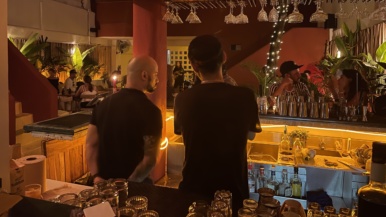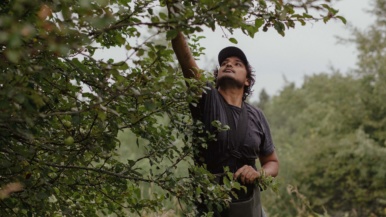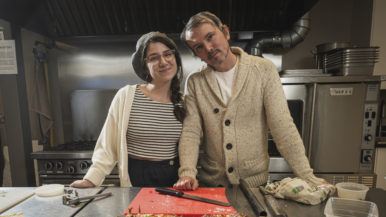I accidentally moved into a seniors’ residence
It’s actually quite pleasant

Last year, with the kids launched and our Cabbagetown house on the market, my wife, Sarah, and I decided to downsize. I’d often passed the hoardings of a 12-storey building in the revitalized Regent Park area, for the two-plus years of its construction. Jolly depictions of prospective tenants on bicycles beckoned the “active” and “semi-retired” to “Continue Your Life’s Adventure.”
I knew the developer specialized in seniors’ residences from my time canvassing as an NDP candidate, but this building was promoted as “an exciting new rental concept” for those 55 and up, where the retired would live alongside younger working folks, such as ourselves. Plus, the place was close to my mother’s house and the pubs and shops at which we’d been regulars for 20 years. “I’ve already registered academics and artists like you,” the showroom agent said. “There’ll be a library, a pub, a fitness area and a pet spa. You’ll love it.” A $500 deposit down on our rental, and we were in.
When the apartment was finally ready, a manager phoned to say we needed a TB test and a health check before we could move in. We complied, Sarah baffled when her doctor tested her for HPV. “Isn’t that for 13-year-olds?” she asked. “You wouldn’t believe what your generation gets up to,” said her doctor. During my appointment with the building’s nurse, she crossed out questions she knew did not apply—Did I want a meal plan? Did I need someone to check on me?—before asking, hesitantly, “Would you like to sign a DNR?” What’s that? “A do-not-resuscitate order.” Not yet, I said.
Our lack of contagions established, we happily settled in to our top-floor apartment—loads of sky and a spectacular view of the city. Only, we couldn’t find anyone our age, save for people depositing their aged parents then making swift exits. We were the de facto millennials in a seniors’ residence. At first, we got a kick out of the situation but, in our more reflective moments, knew that our amusement only deflected our gaze from the inevitable: we’d catch up to our building-mates in time.
During the day, concierges are smartly dressed in black, but come evening, personal support workers in their licorice allsorts uniforms are more in evidence. The ceilings of our apartment are a solar system of precautions: smoke alarms, heat alarms, sprinklers. The fire alarms are a constant, as if no one expected tenants to do anything but microwave in their kitchens. First time around, I called the front desk and asked, “Do we need to vamoose?” “No,” the concierge answered, “someone burned their toast.” A few non-incidents later, we had a routine down: “Third floor. Fish.” “Eleventh floor. Incense.” The floors themselves have monitors for flooding, which seems unnecessary because the flow from the taps is hardly overpowering, and the battle to convince the management team we can handle more than lukewarm temperatures is ongoing. “We don’t have dementia and we’re not in danger of scalding ourselves,” I told the plumber. “My wife simply wants a hot bath.” Still, we managed to evade grab bars in the shower and by the toilet. Small victories.
The staff members are unfailingly gracious. Many work two jobs, and one travels two hours to work. None complain. Not so, the residents. One morning, I passed a very senior woman remonstrating about her Internet service. “I’ll send someone to your room,” said the beleaguered concierge. “It’s not a room,” snapped the woman. “Get the vocabulary. It’s a suite.” I held the elevator for her. She was breathing hard as she struggled with her walker, clearly on the tail end of her life’s long arc. “Such a great building!” I said convivially. She shrugged. “Too many old people.”
And yet there are advantages to living in a seniors’ home. After I dropped an IKEA shelf on my head, my scalp bleeding, I was dreading the wait at St. Mike’s for stitches. “No need,” said Sarah, “there’s a nurse downstairs. She’ll take care of it.” Which she did. And in June, joining the Raptors bandwagon, we passed on crowded pubs and used the screening room, which would do any VIP cinema proud. Gradually, residents joined us, and a staff member served popcorn, the tension of game six unbearable. Said one woman, grabbing her walker: “I have to go out to the terrace and scream!”
Anxiously, I invited my mother for dinner—in our apartment and not the downstairs dining room, though we’ve been given meal coupons we keep threatening our children we’ll use. She is 89 and blind, but her social life is much busier than mine and, unlike her spry son, still lives in a lovely house on her own. I’d prepared myself for her disdain, but she loved the place. “Everybody talks to you,” she said delightedly. Yes, folks talk. Come the next day, some may not remember what they said, but the building is friendly, and I’m beginning to enjoy it for the same qualities my mother noticed: it’s a community. And we’re its inadvertent pioneers.
Noah Richler’s political memoir, The Candidate, is available in paperback.
Email submissions to memoir@torontolife.com





